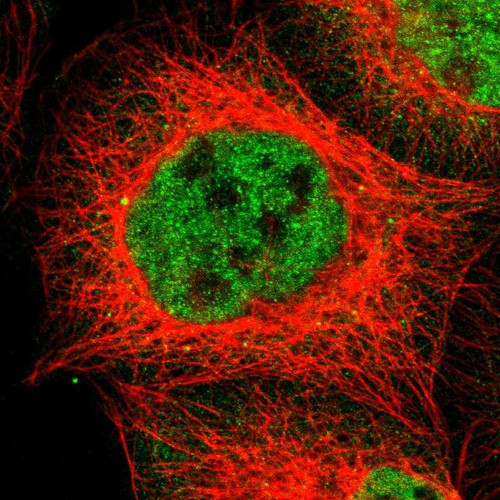Application: WB, ICC
Clonality: Polyclonal
Host: Rabbit
Reactivity: Human
Protein Description: nuclear receptor subfamily 3, group C, member 1 (glucocorticoid receptor)
Gene Name: NR3C1
Alternative Gene Name: GR, GRL
Isotype: IgG
Interspecies mouse/rat: ENSMUSG00000024431: 72%, ENSRNOG00000048800: 71%
Entrez Gene ID: 2908
Uniprot ID: P04150
Buffer: 40% glycerol and PBS (pH 7.2). 0.02% sodium azide is added as preservative.
Storage Temperature: Store at +4°C for short term storage. Long time storage is recommended at -20°C.
Clonality: Polyclonal
Host: Rabbit
Reactivity: Human
Protein Description: nuclear receptor subfamily 3, group C, member 1 (glucocorticoid receptor)
Gene Name: NR3C1
Alternative Gene Name: GR, GRL
Isotype: IgG
Interspecies mouse/rat: ENSMUSG00000024431: 72%, ENSRNOG00000048800: 71%
Entrez Gene ID: 2908
Uniprot ID: P04150
Buffer: 40% glycerol and PBS (pH 7.2). 0.02% sodium azide is added as preservative.
Storage Temperature: Store at +4°C for short term storage. Long time storage is recommended at -20°C.
| Cognate Antibody/Antigen for Anti NR3C1 pAb (ATL-HPA004248 w/enhanced validation) | |
| Antigen | PrEST Antigen NR3C1 (ATL-APrEST86737) |
| Documents & Links for Anti NR3C1 pAb (ATL-HPA004248 w/enhanced validation) | |
| Datasheet | Anti NR3C1 pAb (ATL-HPA004248 w/enhanced validation) Datasheet (External Link) |
| Vendor Page | Anti NR3C1 pAb (ATL-HPA004248 w/enhanced validation) at Atlas |
| Documents & Links for Anti NR3C1 pAb (ATL-HPA004248 w/enhanced validation) | |
| Datasheet | Anti NR3C1 pAb (ATL-HPA004248 w/enhanced validation) Datasheet (External Link) |
| Vendor Page | Anti NR3C1 pAb (ATL-HPA004248 w/enhanced validation) |
| Citations for Anti NR3C1 pAb (ATL-HPA004248 w/enhanced validation) – 4 Found |
| Glucocorticoids Have Opposing Effects on Liver Fibrosis in Hepatic Stellate and Immune Cells. Mol Endocrinol. 2016 Aug;30(8):905-16. doi: 10.1210/me.2016-1029. Epub 2016 Jun 29. PubMed |
| Chronic stress and intestinal barrier dysfunction: Glucocorticoid receptor and transcription repressor HES1 regulate tight junction protein Claudin-1 promoter. Sci Rep. 2017 Jul 3;7(1):4502. doi: 10.1038/s41598-017-04755-w. PubMed |
| The Glucocorticoid Receptor NR3C1 in Testicular Peritubular Cells is Developmentally Regulated and Linked to the Smooth Muscle-Like Cellular Phenotype. J Clin Med. 2020 Mar 31;9(4):961. doi: 10.3390/jcm9040961. PubMed |
| Limitations to intergenerational inheritance: subchronic paternal stress preconception does not influence offspring anxiety. Sci Rep. 2020 Sep 29;10(1):16050. doi: 10.1038/s41598-020-72560-z. PubMed |



